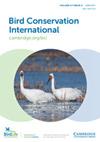Reduction of organic waste in a landfill lowers the visitation probability but not the local abundance of a long-lived scavenger species
IF 1.5
4区 环境科学与生态学
Q3 BIODIVERSITY CONSERVATION
引用次数: 4
Abstract
Summary Globally, vultures are one of the most threatened of all groups of birds. European vulture populations are benefited by several anthropogenic food sources such as landfills. Current European Union directives aim to decrease the amount of organic matter dumped in landfills, reducing this important food source for some vulture species. In this context, we assessed the effect of the reduction of organic waste available and accessible for scavengers in a landfill on the visitation probability and abundance of a local Eurasian Griffon Vulture Gyps fulvus population in Central Catalonia (NE Iberian Peninsula), using a long-term dataset of captured-marked-recaptured individuals in the period 2012–2018. Our results indicated a decrease in the visitation probability due to a significant reduction of organic matter dumped into the landfill after a waste treatment centre was built (0.82 to 0.76) that may cause a permanent emigration of vultures in response to food reduction. However, the estimated annual abundance of vultures tended to grow over time due to the positive trend that regional vulture populations have experienced in recent decades. These results suggest that population processes occurring at regional scales are more relevant to vulture populations than local waste management measures. A reduction in locally available food can make a site less attractive, but species with high dispersal capacity such as vultures may overcome this issue by moving to other suitable sites. Although Griffon Vultures obtain most of the food from domestic and wild ungulates, a regional application of European directives could threaten an important alternative feeding source, especially in food shortage seasons where landfills could be supporting the energetic requirements of the species. Conservation strategies should be planned to counteract the possible negative effects of new European directives on scavenger populations.垃圾填埋场中有机废物的减少降低了长寿清道夫物种的造访概率,但不会降低当地的丰度
综述在全球范围内,秃鹫是所有鸟类中最受威胁的一种。欧洲秃鹫种群受益于多种人为食物来源,如垃圾填埋场。目前欧盟的指令旨在减少倾倒在垃圾填埋场的有机物的数量,减少一些秃鹫物种的这一重要食物来源。在这种情况下,我们使用2012-2018年期间捕获的标记捕获个体的长期数据集,评估了垃圾填埋场中拾荒者可获得和可获得的有机废物的减少对加泰罗尼亚中部(伊比利亚半岛东北部)当地欧亚狮鹫Gyps fulvus种群的访问概率和丰度的影响。我们的研究结果表明,由于垃圾处理中心建成后倾倒到垃圾填埋场的有机物显著减少(0.82至0.76),访问概率降低,这可能会导致秃鹫因食物减少而永久迁移。然而,由于近几十年来该地区秃鹫种群的积极趋势,估计的秃鹫年度数量往往会随着时间的推移而增长。这些结果表明,与当地的废物管理措施相比,区域范围内发生的种群过程与秃鹫种群更相关。当地可用食物的减少可能会降低一个地点的吸引力,但秃鹫等具有高传播能力的物种可以通过转移到其他合适的地点来克服这个问题。尽管Griffon Vultures的大部分食物来自家养和野生有蹄类动物,但欧洲指令的区域应用可能会威胁到一个重要的替代食物来源,尤其是在食物短缺的季节,垃圾填埋场可能会满足该物种的能量需求。应制定保护策略,以抵消欧洲新指令对食腐动物种群可能产生的负面影响。
本文章由计算机程序翻译,如有差异,请以英文原文为准。
求助全文
约1分钟内获得全文
求助全文
来源期刊
CiteScore
3.40
自引率
6.20%
发文量
50
审稿时长
>12 weeks
期刊介绍:
Bird Conservation International is a quarterly peer-reviewed journal that seeks to promote worldwide research and action for the conservation of birds and the habitats upon which they depend. The official journal of BirdLife International, it provides stimulating, international and up-to-date coverage of a broad range of conservation topics, using birds to illuminate wider issues of biodiversity, conservation and sustainable resource use. It publishes original papers and reviews, including targeted articles and recommendations by leading experts.

 求助内容:
求助内容: 应助结果提醒方式:
应助结果提醒方式:


